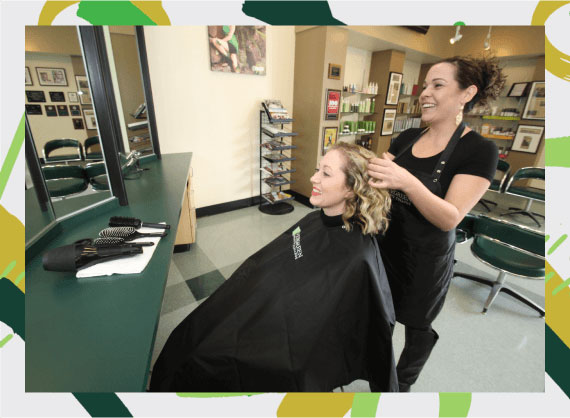A Step-By-Step Guide to Beauty School Accreditation

Microgen – stock.adobe.com
How Does a School Become Accredited?
NACCAS is the largest commission responsible for accrediting beauty schools. NACCAS is recognized by the United States Department of Education as a national accrediting agency for programs of cosmetology arts and sciences, electrology, massage and postsecondary schools. Evergreen Beauty College is proud to be one of a select few institutions that hold this merit as a result of our culture.
Applying for Candidacy
The accreditation process begins with the institution applying to become a candidate for accreditation. The faculty must attend at least one workshop to learn about the agency’s standards of educational performance and how the school itself must report to NACCAS.
Requirements
Once a school is granted candidacy, it begins a process that may take two years or more. This process includes the school reporting to NACCAS about the different ways in which it adheres to NACCAS’ standards. Schools must be in existence for a minimum of two years before they can become accredited.
Accreditation
After a school has become accredited, it must continue to report to NACCAS and maintain the standards that have been established. These standards are often influenced by the expectations of Congress and the U.S. Department of Education. Adhering to nationally stipulated standards of educational performance often helps these schools improve what they have to offer to their students.
Schools can also lose their accreditation by failing to maintain standards or failing to have their accreditation renewed after six years. Schools that lose their accreditation could potentially lose their ability to participate in Federal Student Aid.

Microgen – stock.adobe.com
The Accreditation Checklist
NACCAS standards cover 10 different areas. These areas range from educational objectives and institutional evaluation to Occupational Associates Degree courses of study and programs. Each area must be sufficiently met for a school to become accredited. The following are summary excerpts from NACCAS’ Standards & Criteria.
Educational Objectives and Institutional Evaluation
“The institution has a published mission statement identifying the institution as providing career preparation. The institution assesses its performance as related to its stated objectives, summarizes the results of the assessment, and uses the assessment to maintain or improve institution performance.” (NACCAS’ Standards & Criteria, 7)
Instructional Staff
“The institution employs an instructional staff that is fully qualified and of adequate size to fulfill the objectives of the educational courses and/or program(s) regardless of mode of delivery.” (NACCAS’ Standards & Criteria, 8)
Administrative Services
“The institution has in place administrative policies and services appropriate to the educational courses and/or program(s). Such policies and services meet applicable federal, state, local, and NACCAS policies.” (NACCAS’ Standards & Criteria, 9)
Admissions Policies & Procedures
“The institution has published student admissions policies that are appropriate for the educational courses and/or program(s), and the institution follows these policies.” (NACCAS’ Standards & Criteria, 11)
Student Support Services
“The institution has in place student support services, which provide appropriate information and advice to students.” (NACCAS’ Standards & Criteria, 13)
Curriculum
“The institution offers educational courses and/or programs congruent with the mission of the institution and its educational objectives. Courses and/or programs incorporate job market requirements in instruction through involvement with the institution’s advisory committee. The institution ensures that all courses and/or programs offered by the institution, regardless of location or mode of delivery, are qualitatively consistent.” (NACCAS’ Standards & Criteria, 14)
Financial Practices & Management
“The institution maintains a sound financial condition and has qualified financial management.” (NACCAS’ Standards & Criteria, 16)
Instructional Space & Facilities
“The institution provides equipment, instructional and laboratory space, and other physical facilities that are adequate for instructional needs and meet professional standards of safety and hygiene.” (NACCAS’ Standards & Criteria, 18)
Evaluation Of Students
“The institution uses systematic student evaluation to assist student learning and to demonstrate satisfactory student achievement before a certificate of completion is awarded.” (NACCAS’ Standards & Criteria, 19)
Occupational Associate Degree Programs
“The institution offers Occupational Associate Degree programs and/or courses that are consistent with the institution’s mission and educational objectives. The institution has the discretion to offer associate degrees. Associate degree offerings may be based on demographic needs, student learning objectives, and industry market needs. Associate degrees may reflect concentration within areas such as beauty, health and wellness, and corresponding management programs. All occupational associate degree programs must comply with federal, state, and local regulations and NACCAS Standards and requirements.” (NACCAS’ Standards & Criteria, 20)
NACCAS’ Goals of Accreditation
NACCAS stipulates and maintains three goals associated with the purpose of accrediting institutions that cover a curriculum of cosmetology. The first goal is “To foster and improve post-secondary education and training in cosmetology arts and sciences, massage, and related and unrelated areas.” (NACCAS’ Standards & Criteria, 5). The second is “To establish and enforce minimum standards of performance towards ensuring that accredited post-secondary schools offer, and can be reasonably expected to continue to offer, successful programs to prepare graduates for licensure, certification and/or employment in these areas.” (NACCAS’ Standards & Criteria, 5). The third and ultimate goal of NACCAS accreditation is “To ensure that each accredited institution carries out its educational activities in ethical and responsible ways.” (NACCAS’ Standards & Criteria, 5).
In short, an accreditation from NACCAS is not merely a merit that schools boast for the sake of appearing to be prestigious. A NACCAS accreditation must be earned properly and is a sure-fire way of ensuring that an institution provides its students with the knowledge and resources they need to succeed in their careers. Not only do we at Evergreen Beauty College take pride in our accreditation, but we also take pride in all of our credentials and awards.





Such great information! Thank you